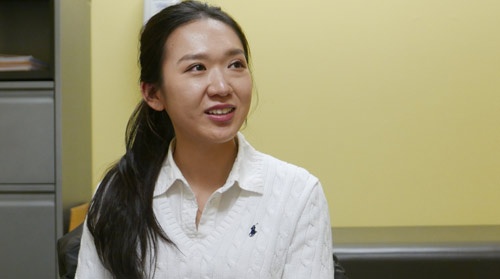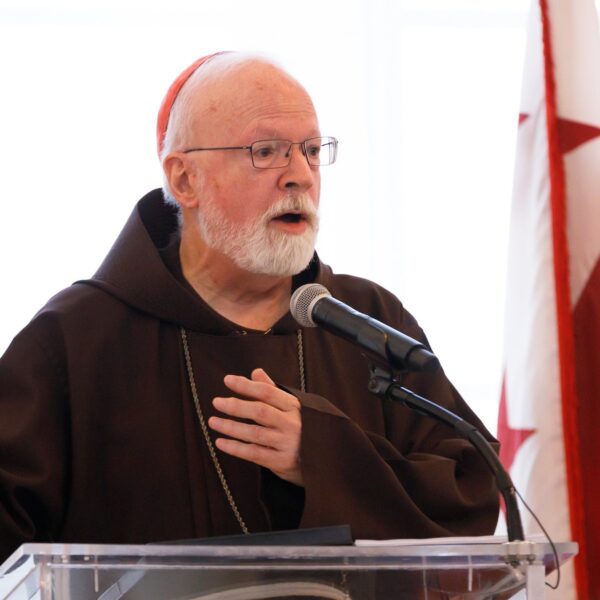Part 2. Read Part 1 here, and the original Sing Tao Daily articles in Chinese here.
Photo: Clara Li, above, is an assistant professor of psychiatry at the Alzheimer’s Disease Research Center, Icahn School of Medicine at Mount Sinai Medical Center.
NEW YORK, N.Y.–As a family caregiver for my mother, who has dementia, I recently participated in six monthly meetings of a Chinese support group in New York.
Although the participants did not know each other before, they found light among hopelessness in each other’s stories, and I felt the group’s tremendous power in these meetings. The members hared the strength of love through human sufferings. Some said they faced similar challenges with family members facing the end of their lives.
The Chinese-community support groups began eight years ago, after and English-speaking Chinese man attended a seminar by the Alzheimer’s Association’s New York Chapter. Feeling the program was very helpful, he suggested the association organize similar seminars and support groups for Chinese-only speakers there.
———————————————————————————————————————————————————————————————————————-
* Xia explained, “Although my 81-year-old mother has dementia, she can still take care of herself. She receives only six hours a day of homecare. When I finish my work, I take over the caring responsibility. One day when I arrived at home feeling very tired, I saw human stool all over the white walls in the living room, some even on my mother’s face.” Xia, 55, said she could not blame her mother, who did not know what she had done. In tears, Xia picked herself up and started to clean her mother and washed the walls. She was physically and emotionally exhausted.
———————————————————————————————————————————————————————————————————————–
Fanny Lau, a former associate director of a senior center, became the first official Chinese social worker at the New York association, which is now an independent nonprofit called CaringKind. Her main focus was community outreach–educating the Chinese community about dementia, and assisting them to obtain the related services.
Although she retired last year and moved to Houston, she recently visited New York City and was warmly welcomed by families of dementia patients. Ms. Jiang (named changed for privacy concerns), whose husband is hospitalized due to his late-stage dementia, said, “Fanny is the beacon in the darkness. When my husband was initially diagnosed with the disease, our family didn’t know how to deal with it.”
Ms. Jiang continued, “Every dementia patient has a different situation; it brings a lot of trouble for the family and to our emotions. Fanny provided us with information; in fact, she was like our Wong Tai Sin,” she said, referring to the mythic Taoist master of the fourth century renown for his healing power. “When there were needs, she helped. I remember one time my husband got lost at night. Fanny answered my distressed phone call right away,” she said.
During Lau’s visit with a group she had helped before, the caregiver held her hands and told this reporter that Lau stayed with them through many difficulties. Her assistance far exceeded the responsibilities of a social worker, they said.
Lau is known to virtually every Chinese family with a dementia patient. Her office was in Midtown, but she could be found in every corner of the Chinese community, such as hospital events, community seminars, health insurance institutions. She spent every effort to promote all kinds of free Alzheimer’s services, helping raise the awareness of the “disease of the century” throughout the Chinese community.
———————————————————————————————————————————————————————————————————————–
May feels helpless each time she talks about her housemate, who is a fellow Malaysian, also in her 70s: “We were like sisters and supported each other.” But after the onset of dementia, she became paranoid “and blames me for stealing her things. From night to dawn she mutters nonstop.” Despite this stress and lacking any training as a caregiver, May feels she cannot abandon her friend, who is estranged from her family and an undocumented immigrant–so she can’t seek help from a government agency. May never expected her life in retirement to become so helpless.
————————————————————————————————————————————————————————————————————————-
When people suffered from the disease, their family members learned how to provide care to and deal with the patient, including knowing the early, midterm and late-stage symptoms. Because patients gradually lose their cognitive abilities and judgment it is important to help the patients to make financial arrangements and prepare their last will while their mind is still clear, in order to avoid misunderstandings between the patient and the family members.
On seeing the positive interaction and encouragement in support groups for patients’ families among other ethnic groups, Lau started the first Chinese support group in 2008 in Flushing’s Chinatown in Queens.
Both the patients and their families met together once a month. The group, started with a few people, has now grown to almost 40, packing the basement meeting room of Flushing Library.
During the two hours at the monthly meetings, each person shares his or her own story. They discuss information about the traits of dementia at different stages, at which stage should the patients be sent to a nursing home, how to deal with confrontations and self management, how to help nursing homes show better concerns to family members, how to submit a complaint when problems arise, and what kinds of food or exercise might minimize the probability of getting Alzheimer’s disease.
Some of the care providers suffer from emotional tension and even depression as they have been caregivers of dementia patients for a long time. They need to vent their feelings. The support group brings moments of fresh air into their nearly daily emotional suffocation. Group participants try to clear their minds.
————————————————————————————————————————————————————————————————————————-
Sen, 86, was big, tall and from a wealthy family. When he developed Alzheimer’s disease, his family sent him to a supposedly good nursing home. However, he loved to run around and shout. On one visit, Mrs. Sen saw attendants tying her husband to a bed. In tears, she brought him home for 24-hour care. But the home care workers became frustrated at his behavior–removing his pants and pooping on the dining room floor, or running around the house naked. Eventually, the aides started tying him to a chair, just as the nursing home staff had, and finally using heavy medication to calm Sen down.
————————————————————————————————————————————————————————————————————————
In struggling to tolerate and accommodate the patients, some group members express a tremendous sense of guilt. In this way, the support group functions like a small church where everyone looks deep inside, making confessions, crying, receiving inspiration–and sometimes feeling divine light.
More often, though, participants witness “tears of love.” Once, three months after a group member’s husband died from the last stage of dementia, the widow journeyed through the lament of death and separation before finding calm. In returning to the group to share her personal struggle and how much she missed her husband, she showed others how to face the end of life.
“I have received much encouragement and comfort here,” she said. “Now I want to share my experience in order to help others.” In the face of this incurable disease, and seeing their loved ones gradually turn into strangers and then pass on because of dementia, such feelings of so-close-and-yet so-far bring the group members together as they face lives that seem to have been determined by destiny. They experience love among the humankind first hand.
Due to increasing number of caregivers, the Chinese community now has three support group, with sessions also in Brooklyn and Manhattan, including one conducted in Mandarin and two in Cantonese.
They are led by Shi Weijing (646-744-2951), outreach manager at CaringKind, and Serene Nie (646-744-2970), a registered social worker.
This two-part series is adapted from a longer article presentation published in the Chinese language in Sing Tao Daily (New York). Lotus Chau wrote the articles with support from the Journalists in Aging Fellowships, a program of New America Media and the Gerontological Society of America, sponsored by the Silver Century Foundation.
Chinese Services Scarce For Dementia Patients
Chinese elders with dementia are often sent to psychiatric emergency rooms in urgent situations, but this kind of service has been very limited due to language barriers. In early June, New York’s Beth Israel Medical Center announced that it expects to close for rebuilding in four years, and may eliminate one of the few psychiatric emergency services available to dementia patients serving Manhattan’s Chinatown.
Beth Israel, which has served New York City for more than 125 years, will be rebuilt as a smaller facility with some services possibly shut down because of tight resources and financial deficits in recent years.
Selina Chan, who served for 10 years as the hospital’s Asian Services director and who retired in May, observed there are only three psychiatric emergency rooms in Manhattan — Beth Israel, Bellevue Hospital Center and Mount Sinai Hospital. The first two provide Chinese language interpreters.
Beth Israel’s closing would likely be a huge blow to the Chinese community, Chan and others say. Experts attribute such changes to today’s high medical cost and hospitals mergers, often leading to the sacrifice of medical services available to the low-income minorities.
Countering Mental-Illness Stigma
Like the hospital situation, there is a severe lack of senior centers in New York’s Chinatown that provide services for elders with dementia. According to the city’s Department for the Aging, only five of the city’s roughly 300 senior centers are located in Manhattan’s Chinatown.
Also, only one of the 10 senior daycare centers in Manhattan’s Chinatown serves elders with dementia, Hamilton-Madison House (HMH) Social Adult Day Center.
In fact, there are only seven dementia-focused centers throughout the city.
Because these centers receive extra funding. New York City Council member Margaret Chin was able to allocate an additional $95,000 to the to the HMH in 2014, making it possible to open four days a week instead of three days before, to better serve seniors and their families.
Isabel Ching, executive director HMH center, said as the population ages, the program has discovered that many older people who have early signs of Alzheimer’s disease or other dementias become the subject of ridicule. They are called “neuropathy” or “crazy people” and are isolated by the stigma of mental illness. Due to this, the agency designated a separate room in 2003 for special events arranged for these elders. The center also designed special day schedules for the physical and mental health for elders with dementia.
Because an increasing number of seniors required special care the center ran out of space. The HMH City Hall Senior Center was able to expand in 2013, and became the first mixed used adult day care center in Chinatown bringing together the general elderly population and elderly patients showing early dementia symptoms.
At the center, food and activities are planned by the Department for the Aging and the Health Department and include such aspects as a large TV and several computers. There is a guitar and a piano at the corner. Most eye-catching are the floor-to-ceiling windows through which people can see South Street and the view of the East River. One can see the sunset in good weather.
For those who lost their spouses, suffer serious depression or feel depressed, watching the river and contemplating quietly give them a peaceful personal space. Sometimes nature brings the best comfort for the mind.
–Lotus Chau











